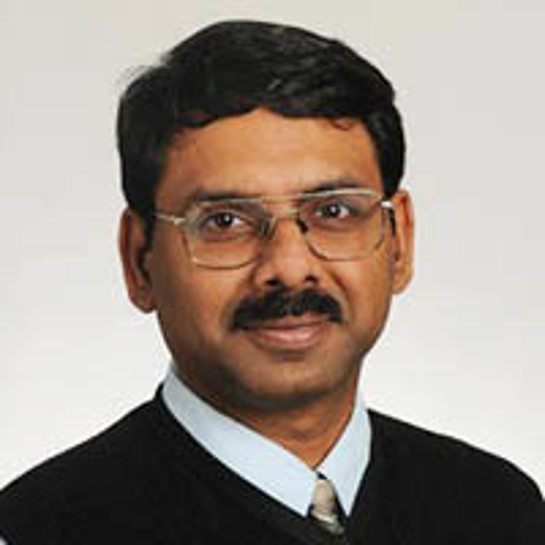Justice, Equity, Diversity, and Inclusion in Applied Mathematics for All
To enhance the mathematical community’s understanding of racial equity in applied mathematics research and education, SIAM held its first Justice, Equity, Diversity, and Inclusion (JEDI) workshop during the 2021 SIAM Annual Meeting (AN21), which took place virtually in July. Ron Buckmire—SIAM’s Vice President for Equity, Diversity, and Inclusion (EDI)—and Padmanabhan Seshaiyer—chair of SIAM’s Diversity Advisory Committee (DAC)—hosted and moderated the two-part series. DAC members Suzanne Lenhart (University of Tennessee), Ami Radunskaya (Pomona College), Josef Sifuentes (University of Texas Rio Grande Valley), and Luis Melara (Shippensburg University) helped facilitate the session.

The interactive nature of this inaugural event allowed participating students, faculty, and staff to discuss equitable opportunities to ultimately transform institutional practices at multiple levels and settings. The JEDI workshop integrated best practices in mathematical research, outreach, and engagement programs with retention and recruitment strategies that pertain to the most pressing questions and compelling opportunities for advancing racial equity in applied mathematics education. We strove to reach beyond the current paradigms that contribute to persistent racial inequalities in the field of applied math.
The session actively engaged the audience with brainstorming projects via Google Jamboard and Google Slides. Attendees partook in a four-corner pedagogical activity called “Notice and Wonder,” wherein they examined four images that illustrated the importance of the differences between the words “inequality,” “equality,” “equity,” and “justice” (see Figure 1). For example, the notion of equality addresses some systemic concerns by providing the same applied mathematics resources and opportunities to all students, but equity goes further by recognizing that each individual has different needs. This realization highlights the value of customized resources and opportunities. Participants also realized that while the concept of equity may address imbalanced social systems in the applied math community, justice would mean that these systems are fixed in a way that leads to long-term, sustainable, and unbiased access to resources and opportunities.

Next, session attendees identified similarities and differences between justice and EDI in applied mathematics with a Venn diagram exercise (see Figure 2). Their responses clearly highlighted the need for additional conversation within the community. Relevant topics for further discussion include mentorship, systemic racism and culturally responsive teaching practices, increased representation, equitable assessment and evaluation, and economic and racial disparities.
During the final part of the workshop, participants presented ideas or actions that they—and/or their units/departments/universities—can take (or are already taking) to promote JEDI practices (see Figure 3). The response was overwhelming. Suggestions included collecting evidence of disproportionate representation in the number of awarded bachelor’s degrees, investigating underrepresentation of women and racial and ethnic minorities, providing implicit bias training, amending hiring practices, and re-envisioning speaker selection at conferences. Discussions also highlighted the impact of unconscious gender bias, which is influenced by cultural stereotypes, affects how individuals evaluate and treat one another, and continues to impact both university and workplace environments. Ultimately, this dialogue built effective practices to combat systemic barriers to opportunities and address access, retention, and success in applied mathematics education.

Another pedagogical practice called “KWL: Know, Want, Learn” prompted attendees to voice “What they know,” “What they want to know,” and “What they learned.” This exercise allowed individuals to identify and share current challenges and opportunities that relate to JEDI in the applied math community.
According to the exit survey, more than 92 percent of attendees felt that the session had a positive impact. One participant mentioned that they learned “how to explain/talk about race versus ethnicity.” Others reflected on connections that they made in the workshop and recognized the danger of making assumptions about ancestry because everybody’s personal experiences and history are different.

In addition to inspiring stimulating discussion, the JEDI workshop at AN21 provided training for applied mathematics educators and graduate students who wish to promote awareness of implicit biases, which can take many forms. For instance, implicit bias may involve assumptions about students’ learning behaviors and capabilities for academic success based on their identities and/or backgrounds. The session also created a platform for healthy discussion wherein educators could self-assess their own biases, learn to develop formal and informal reflective teaching strategies, and work to foster an inclusive applied mathematics classroom climate to enhance their teaching and mentoring practices.
Gerardo Hernández-Dueñas, president of the Mexico Section of SIAM, was inspired by the JEDI session and hosted a similar workshop at the Annual Meeting of the Mexican Geophysical Union in November 2021 on diversity, ethics, equity, and inclusiveness in the context of best practices in academic and geoscience organizations. “At MexSIAM, we believe that these are fundamental topics to our community,” Hernández-Dueñas said. “I found the tools you presented very impressive and efficient to engage the mathematics community to learn and share new ideas about JEDI.” Another JEDI collaborative session with additional speakers will take place at the upcoming 2022 Joint Mathematics Meetings in Seattle, Wash.
About the Authors
Padmanabhan Seshaiyer
Professor, George Mason University
Padmanabhan Seshaiyer is a professor of mathematical sciences at George Mason University who previously served as chair of the SIAM Diversity Advisory Committee. He works in the broad area of computational mathematics, mathematical biology, data science, biomechanics, design thinking, and STEM education. Seshaiyer is also chair of the U.S. National Academies Commission on Mathematics Instruction and Associate Director for Applied Mathematics at the Math Alliance.

Ron Buckmire
Associate Dean for Curricular Affairs, Occidental College
Ron Buckmire is a professor of mathematics and Associate Dean for Curricular Affairs at Occidental College. He publishes research in numerical analysis, mathematics education, and data science.
Stay Up-to-Date with Email Alerts
Sign up for our monthly newsletter and emails about other topics of your choosing.



